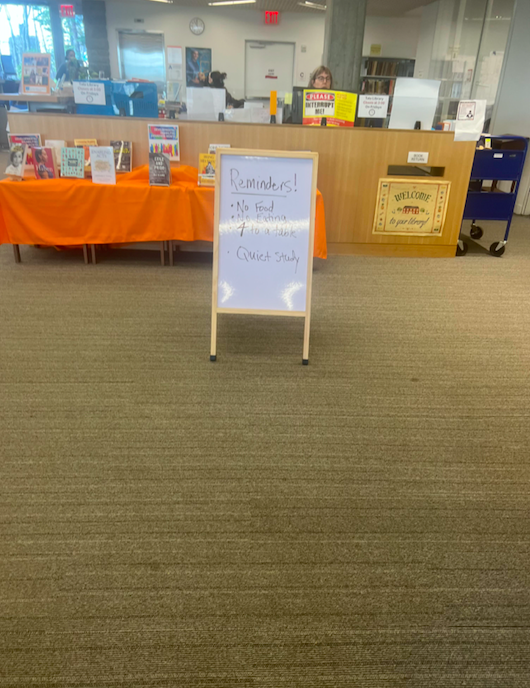Pictured: A Whiteboard Inside The Tate Library Reads the Rules
Our library, The Luther Tate Library, is a beloved spot on campus. It is a place for individual research, group projects, class instruction and private repose. Students come to this space to study, meet with tutors in study rooms, gather with friends, relax, scroll on their phones during free bands and so much more. Students gather in this space more frequently than any other on our campus. Unfortunately, the immense desire to spend time in the library has created a culture of chaos, one in which the rules are often disregarded.
The library has settled on two main rules. Each with the goal of supporting the academic environment. The first is “four to a table” during A and B Band. This rule strives to prevent large gatherings of students at one tiny table. The next is “no food in the library.” This rule intends to avoid spills and mice. The question “If we allowed students to eat – would they clean up for themselves?” is rhetorical. Given the state of our cafeteria, it seems like a forgone conclusion that students wouldn’t be able to maintain the state of library cleanliness if allowed to eat inside.
Katie Elwood, a librarian, spoke from her experience maintaining these rules, “We don’t teach, we don’t give people grades, so I think we’re dismissed often. Tom Carey is the administrator assistant, he’s the major of the library, he tries to broker students’ good faith, but as Cornelia Locher likes to say this is her classroom, “and if we need you to leave the space because you’re being disruptive, it’s our call. And hopefully it doesn’t come down to that.”
While the library’s current rules may seem highly restrictive, our librarians have compromised time and time again as they work to make the library as student friendly as possible. A few years ago, the library had rules that included restrictions on what students could do in the library. Students were only allowed to engage in academic work and video games were prohibited. Study rooms had to be booked 24 hours in advance but now, they are first come, first serve.
Elwood spoke of the compromises they have made and continue to make. “We want to put the students first. We are always trying to balance what’s best.” She spoke of how some students come up to them and ask for others to be quieter while others ask to be allowed to speak to their friends. The librarians try to balance these diverging requests while maintaining their goal for “the library, to be an academic space for students doing schoolwork to do schoolwork.”
Our campus has many places to converse loudly with friends or eat: the student commons, quad, cafeteria, empty classrooms and student facilities, yet students come back to the library time and time again. It seems that we love the library for the the strength of the book and digital collections, the feel of a college library, its light and spaciousness, cleanliness, a variety of seating, lender laptops and printers. Students love the library for each quality that makes it a library. If there were no rules in place, we would just have a second student commons with books. Yet students still push back on the rules. Sophomore Lily Saal, shared her thoughts, “The more you outlaw it the more people will do it.” It seems that students would push back less if there was a variation of these rules that allows for more leniency.
Saal suggested “designated areas in the library to eat or talk loudly.” Another sophomore, Caitlin Neidow, suggested “student librarians who could help enforce peace.” Students spoke of wanting to be allowed to eat in the library as long as they clean up after themselves and fit five to a table as long as they keep their noise down. Neidow said she thought there could be a “trial period” for new rules to see if the student body could handle more flexible policies.
Students do not want a free for all, rather they would like versions of the rules that allow for exceptions. These exceptions would benefit students who study better with food, or come to the library during their first period starving. It would support athletes who stay in the library until 6 p.m. each night and want to eat before practice. It would allow for a table with five or six quiet students to enjoy their time together and not exclude any members of the group.
A variability within the rules would provide opportunity for those working on group projects of four or more to collaborate in our community’s favorite academic space. The librarians face the burden of enforcing rules against a rowdy student body and compromise would be in the best interest of everyone.






